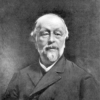Hippolyte Taine

Hippolyte Taine
Hippolyte Adolphe Tainewas a French critic and historian. He was the chief theoretical influence of French naturalism, a major proponent of sociological positivism and one of the first practitioners of historicist criticism. Literary historicism as a critical movement has been said to originate with him. Taine is particularly remembered for his three-pronged approach to the contextual study of a work of art, based on the aspects of what he called "race, milieu, and moment"...
NationalityFrench
ProfessionCritic
Date of Birth21 April 1828
CountryFrance
Hippolyte Taine quotes about
Amid this vast and overwhelming space and in these boundless solar archipelagoes, how small is our own sphere, and the earth, what a grain of sand!
I have studied many philosophers and many cats. The wisdom of cats is infinitely superior.
For thirty centuries, from her sacred seat the cat looked down, and crouching at her feet, beheld the race of conquering Pharaohs kneel.
Man may be considered as a superior species of animal that produces philosophies and poems in about the same way a silkworm produces their cocoons and bees their hives.
The more I study the things of the mind the more mathematical I find them. In them as in mathematics it is a question of quantities; they must be treated with precision. I have never had more satisfaction than in proving this in the realms of art, politics and history.
In the stormy current of life characters are weights or floats which at one time make us glide along the bottom, and at another maintain us on the surface.
Change a virtue in its circumstances find it becomes a vice; change a vice in its circumstances, and it becomes a virtue. Regard the same quality from two sides; on one it is a fault, on the other a merit. The essential of a man is found concealed far below these moral badges.
Kindly politeness is the slow fruit of advanced reflection; it is a sort of humanity and kindliness applied to small acts and every day discourse: it bids man soften towards others, and forget himself for the sake of others: it constrains genuine nature, which is selfish and gross.
To have a true idea of man or of life, one must have stood himself on the brink of suicide, or on the door-sill of insanity, at least once.
I wish to reproduce things as they are or as they would be even if I myself did not exist.
History is nothing but a problem of mechanics applied to psychology.
After the collection of facts, the search for causes.
A fixed idea is like the iron rod which sculptors put in their statues. It impales and sustains.
The production of a work of art is determined by the material and intellectual climate in which a man lives and dies.